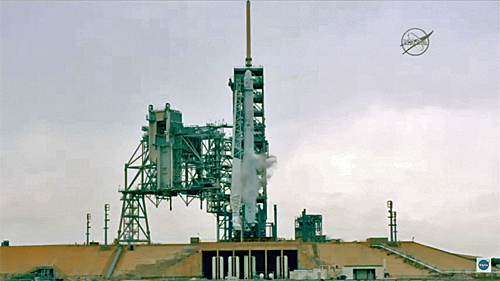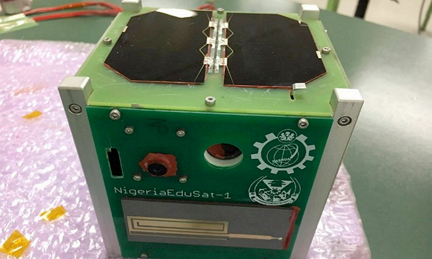
The SpaceX launch from Cape Canaveral with the NigeriaEdusat-1 aboard. The satellite is designed, built and owned by FUTA in collaboration with NASRDA, Abuja, Nigeria.
At Exactly 10:07 a.m. on Saturday, June 3, the Federal University of Technology (FUTA) in Nigeria made history when the SpaceX Falcon9 Rocket launched the Birds 1 five cubesat satellites that belong to Japan, Ghana, Mongolia, Nigeria and Bangladesh from the Kennedy Space Centre in Florida.

The Nigerian CubeSat, code name NigeriaEdusat-1, was designed, built and owned by FUTA (Federal University of Technology, Akure ) in collaboration with the National Space Research and Development Agency, NASRDA, Abuja, Nigeria, and Kyushu Institute of Technology, Japan. Ibukun Adebolu of FUTA’s Department of Mechanical Engineering is the representative of Nigeria on the project. The initial launch that had been scheduled for Thursday June 1 was aborted due to adverse weather condition.
The satellite is expected to dock at the International Space Station, ISS, on June 5, at 10:30 a.m. Nigerian time. This will be the first University satellite to be launched in Nigeria. The satellites will be deployed into orbit during the last week of June 2017 from the ISS.

The major objective of Nigeria Edusat-1 is to continue to build satellite technology in FUSA for research, resources and environmental management as well as for the sustainable socio-economic development of the nation. The satellite technology development will have spillover benefits on Science, Technology, Engineering and Mathematics (STEM) education, an essential tool for a country industrial development.
Mr. Adebolu, who was involved in the Structure Configuration Design, BIRDS Project, offered details of his role. "Drawing on my background in Mechanical Engineering, I has the task of ensuring that our satellites have sufficient strength and rigidity to survive the rigorous launch and space environments. In order to achieve this, I have to ensure that all payload and bus systems are properly accommodated within the 10 cubic centimeter structure. This is very challenging as it involves a lot of optimization and various trade-offs. In the future, I hope to work on other aspects of satellite design.”
The Vice Chancellor of FUTA, Joseph Fuwape, said with the successful launch, the capabilities of Nigerian scientists are in the spotlight and that would build on the success of the launch to cement into place the nation's leading position in cutting edge research and scientific breakthroughs.
Article sourced from Premium Times.

